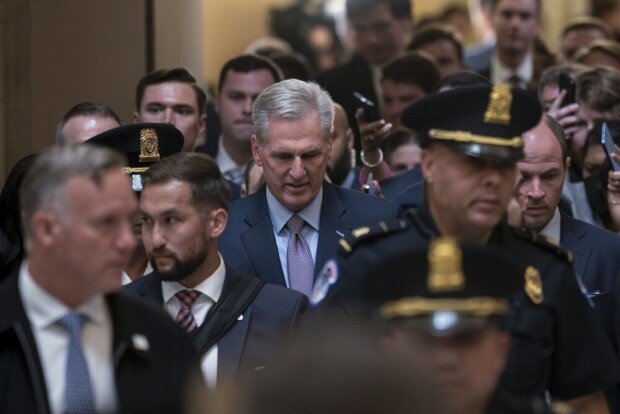Vetocracy of eight hardliners paralyze US Congress
Vetocracy of eight hardliners paralyze US Congress
Posted October. 05, 2023 08:24,
Updated October. 05, 2023 08:24

"The office of speaker of the House of the United States House of Representatives is hereby declared vacant.”
On Tuesday(local time), silence fell on Capitol Hill as the resolution to oust U.S. House of Representatives Speaker Kevin McCarthy was passed. “Now what?” shouted a Republican representative at the hardliners of the Republican Party who led the dismissal of House Speaker McCarthy, a Republican. The unprecedented dismissal of the house speaker, which occurred immediately after the crisis of the federal government shutdown was temporarily resolved, plunged the U.S. political world into chaos.
● Vetocracy led by eight lawmakers
‘Vetocracy’ refers to extreme partisan politics that rejects the other party’s policies and claims. It became widely known after being used by Stanford University professor Francis Fukuyama, who lamented the shutdown of the U.S. federal government in 2013 after bi-partisan conflict over the introduction of Obamacare.
The dismissal was triggered by an internal dispute within the Republican Party over next year's budget. As the federal government faced the threat of a shutdown, House Speaker McCarthy reached an agreement with the executive branch and passed a 45-day temporary budget, to which ‘Freedom Caucus,’ a group of hard-line Republican lawmakers determined to reduce the fiscal deficit, strongly protested. Rep. Matt Gates, a member of the Freedom Caucus, submitted a bill to dismiss the speaker of the House on Monday, which was passed the next day contrary to expectations.
The Freedom Caucus, founded in 2015, has about 45 members, of which only eight supported House Speaker McCarthy's dismissal. The ousting, however, happened because the Republican Party held only three more seats than the majority (218 seats) of the 435 seats in the House of Representatives. With a majority party with only 221 seats, even a small portion of the party's lawmakers not being present may represent opinions entirely different from the majority. All the Democratic Party members voted in favor of the dismissal, anticipating internal strife in the Republican Party ahead of the presidential election next year. Eventually, the bill was passed due to the departure of eight hardliners from the Republican Party.
● Difficulties in selecting next House Speaker
The Congress has decided to elect a new speaker next Wednesday. The White House issued a statement expressing hopes for the Congress to quickly select a new speaker, saying that the urgent challenges facing our nation will not wait.
House Speaker McCarthy refused to run for the position, and it is unlikely for any Republican leader to step forward in a situation dominated by hawks. Rep. Gates, who led the dismissal motion, has supported House Majority Leader Steve Scalise as the next house speaker. It is unknown whether he is inclined to run, particularly as he is battling blood cancer.
weappon@donga.com






